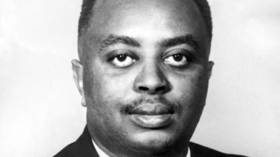Belgium complicit in killing of popular African leader, book claims

Belgium has “overwhelming responsibility” for the killing of Prince Louis Rwagasore, the popular Burundian leader who sought to unite the country’s ethnic groups as it gained freedom from the colonial power, new evidence shows.
Weeks after being elected prime minister in a landslide, Rwagasore, the 29-year-old son of a former king, was assassinated in October 1961. The governing Belgian elite masterminded the shooting while Brussels turned a blind eye, according to archived records uncovered by Flemish sociologist Ludo De Witte.
Although the shooter, a Greek national, and five accomplices were executed, De Witte said that probes by the Belgian colonial court, the government of independent Burundi, and the UN all neglected Belgium’s role in the killing, which led to decades of war, ethnic tensions, and instability.
Publishing his findings in a book titled ‘Murder In Burundi’, De Witte noted that then-Belgian governor Roberto Regnier had told a post-election crisis meeting of senior Belgian officials and allies in the Belgium-friendly Christian Democrat party (CDC) that “Rwagasore must be killed.”
According to the author, the CDC saw his words as an invitation. Regnier’s remarks were apparently confirmed by four people at that meeting to a 1962 inquiry by prosecutors in Brussels. But that report had not been published until De Witte unearthed it during a five-year investigation into the murder.
It also appears the UK was at least aware of the danger faced by Rwagasore, with Britain’s then-ambassador James Murray writing in a 1962 dispatch that influential Belgians had “an almost pathological hatred” of the charismatic leader, who they believed would harm Belgian-Burundian relations. Murray noted that Regnier’s “words... go very far in the direction of incitement to murder,” according to De Witte.
The book also accuses then-Belgian foreign minister Paul-Henri Spaak – today celebrated as a founding father of the EU – of ignoring Regnier and other conspirators on a “war footing” with Rwagasore. It also finds fault with King Baudouin, who “moved heaven and earth” to commute the assassin’s death sentence to life imprisonment.
Last October, a special commission into Belgium’s colonial past admitted it paid “limited attention” to Burundi and Rwagasore’s killing. De Witte attributed this to a “reticence” among the country’s elite to “confront the reality” of colonization.
Meanwhile, a Belgian Foreign Ministry spokesperson did not respond to the book’s charges, but told The Guardian that the government was waiting for parliamentary recommendations before adopting a policy position.












